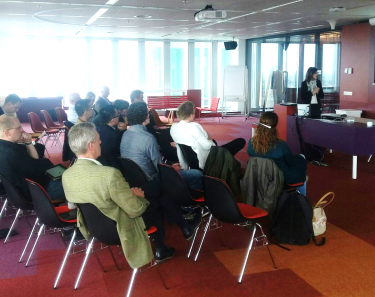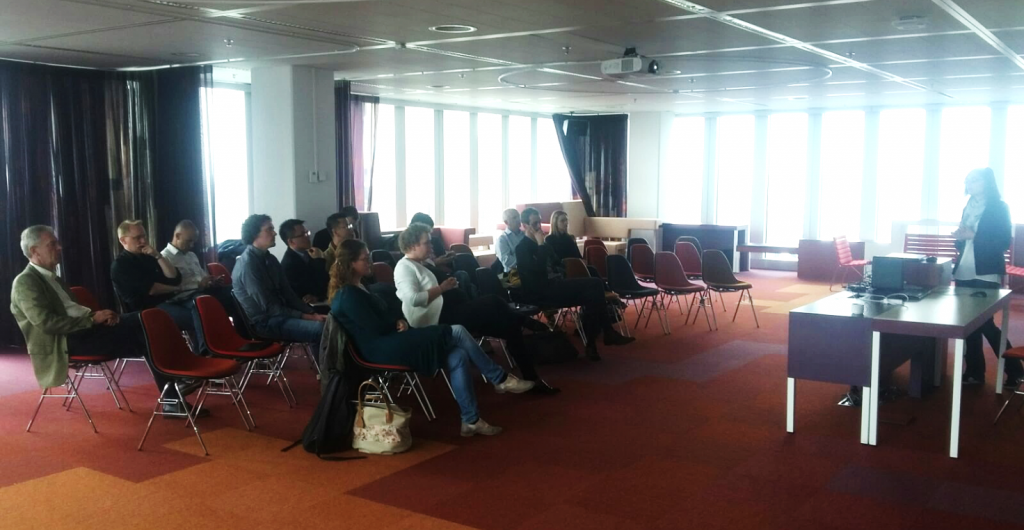This May, on the 24th, Urbasofia traveled to Rotterdam to chair and facilitate an ESPRESSO workshop on Smart Cities and Use Case definition for the Rotterdam project pilot. This was our second workshop, with the first in Bucharest on April 21, and it yielded significant and interesting information.
The Pilot Workshop took place in the Gemeente Rotterdam, Wilhelminakade 179, witnessing 14 participants, mainly from the Rotterdam municipality (account managers, head of department of Geo-information, GIS experts, project manager for Smart Cities, initiator of „The Digital City”), but also key stakeholders such as Future Insight. The main aim of the workshop was to establish a first discussion on the priorities of Rotterdam for being an ESPRESSO Pilot, starting with the key questions:
- What represents the concept of Smart Cities for Rotterdam?
- What are the principles of SC for the city, and which are the current achievement?
- What future plans and strategies need to be taken into account?
- What are the opportunities, barriers and future development plans in the key sectors of importance for the city?
- What case studies of interest can be considered for the ESPRESSO project?
Sectorial Systems and priorities
- Safe City concept (Rotterdam has a mixed population and aims at enhancing the intra-urban safety);
- Water and waste management,
- Mobility, in an effort to plan together with the neighbouring municipalities;
- Education and youth;
- Energy transition;
- Healthy environment and the liveable city;
- Communication and participation;
- Water management is central to the city’s interests.
Another priority is the facilitating and supporting of cooperation and trade economy. All systems have been identified as interconnected, meaning each system will leave a mark on the others.
Rotterdam is in the process of setting up a Data Marketplace to capitalize on the „economy of scale” of putting out data which is open from public and private sources. The (end) goal is to organize an independent open data exchange platform where all kinds of data can be exchanged under negotiated conditions. It concerns big, open, linked and other kinds of data. At this moment people within the organization are working on an open data platform for the own data of the Municipality. A key concern for Rotterdam is how to make data coming from quite a lot of sources useable and useful (defining primary but also secondary uses or positive externalities and transforming the interface to big data). Key question: How can open data usage be, in the end, monetized? Delivering open data requires a cost, so can the advantages be somehow quantified?
Rotterdam is still in the process of figuring out how to quantify, or „show” the benefits of open data (monitor economic and societal results and outcomes). Data should be presented user friendly, since not all users have the required technical background to use it. Additionally, in order to build user trust, it was discussed that a potential approach would be to have an organization outside the municipality to communicate with citizens (like a catalyst), offering a „non-aligned” position and being able to leverage and understand interests. Moreover, open data is still not high-quality, and this aspect was discussed as one of the reasons why businesses still do not use open data.
Asset management is key.
Rotterdam draws microdata at building level all across the city in various sectors (including education, demographics, etc.) and they aim to transform the municipal work, to start becoming information-driven work in a „smarter” way.
Ideas for use cases and scenarios fitting the ESPRESSO concept and aims have been many. In the following months, we will work closely, under ISOCARP, with the city to assist them to prepare piloting.
The meeting brought out content of excellence and reinforced the idea that Rotterdam is one of the flagship cities for the Smart City concept. We are happy to have them as an ESPRESSO Pilot!


